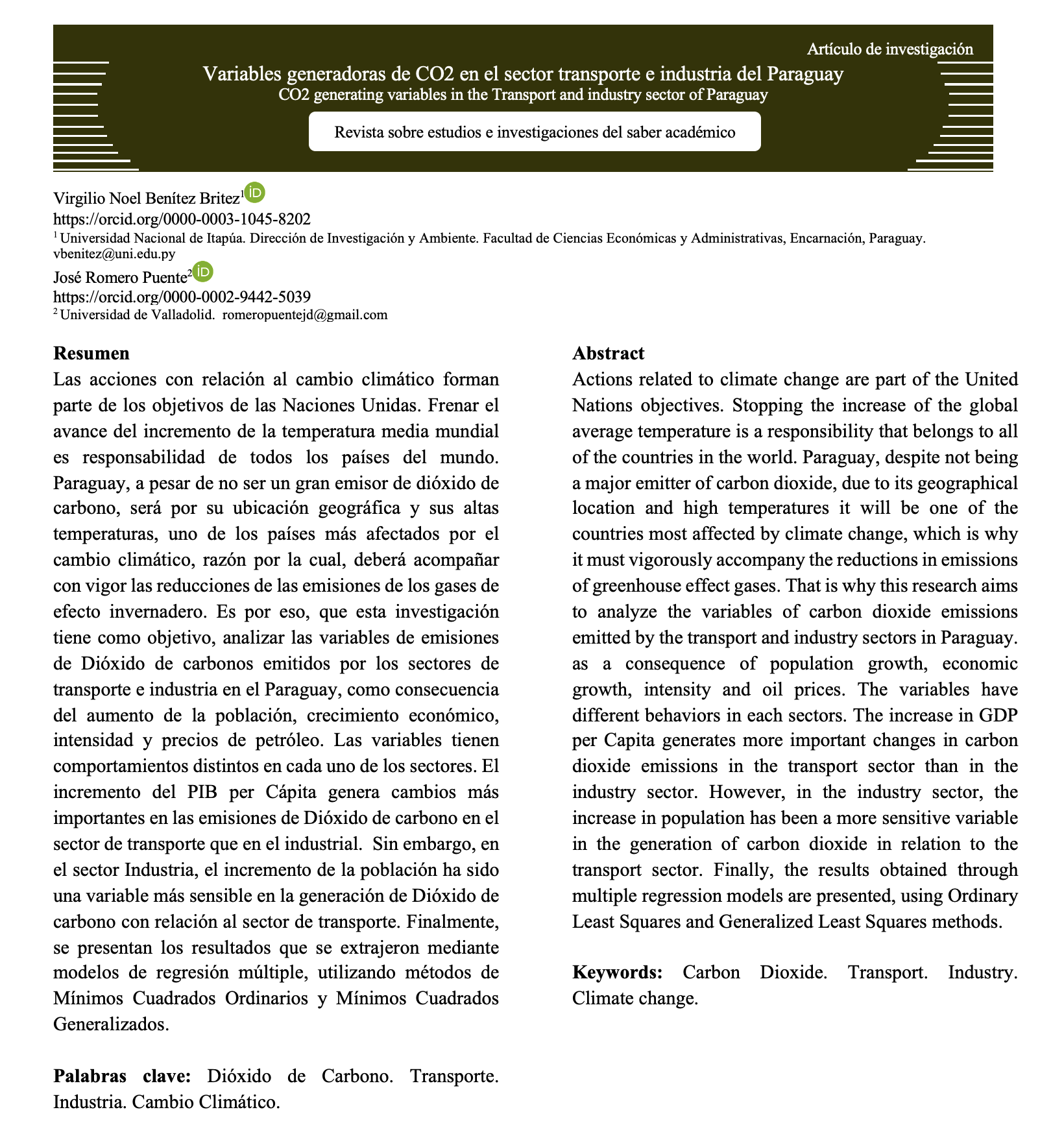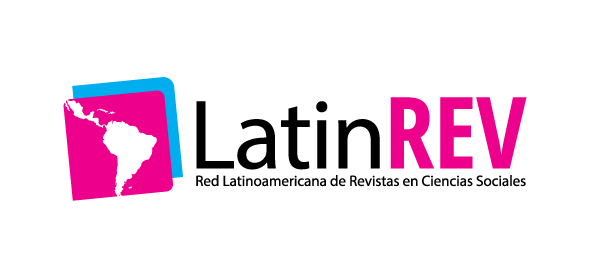Variables generadoras de CO2 en el sector transporte e industria del Paraguay
DOI:
https://doi.org/10.70833/rseisa17item251Palabras clave:
Dióxido de Carbono, Transporte, Industria, Cambio ClimáticoResumen
Las acciones con relación al cambio climático forman parte de los objetivos de las Naciones Unidas. Frenar el avance del incremento de la temperatura media mundial es responsabilidad de todos los países del mundo. Paraguay, a pesar de no ser un gran emisor de dióxido de carbono, será por su ubicación geográfica y sus altas temperaturas, uno de los países más afectados por el cambio climático, razón por la cual, deberá acompañar con vigor las reducciones de las emisiones de los gases de efecto invernadero. Es por eso, que esta investigación tiene como objetivo, analizar las variables de emisiones de Dióxido de carbonos emitidos por los sectores de transporte e industria en el Paraguay, como consecuencia del aumento de la población, crecimiento económico, intensidad y precios de petróleo. Las variables tienen comportamientos distintos en cada uno de los sectores. El incremento del PIB per Cápita genera cambios más importantes en las emisiones de Dióxido de carbono en el sector de transporte que en el industrial. Sin embargo, en el sector Industria, el incremento de la población ha sido una variable más sensible en la generación de Dióxido de carbono con relación al sector de transporte. Finalmente, se presentan los resultados que se extrajeron mediante modelos de regresión múltiple, utilizando métodos de Mínimos Cuadrados Ordinarios y Mínimos Cuadrados Generalizados.
Descargas
Referencias
Adedoyin, F. F.-l. (2020). Modelling coal rent, economic growth and CO2 emissions: Does regulatory quality matter in BRICS economies? Science of the Total Environment, 710, 136284. Obtenido de https://doi.org/10.1016/j.scitotenv.2019.136284
Adedoyin, F. F.-l. (2020b). Modelling coal rent, economic growth and CO2 emissions: Does regulatory quality matter in BRICS economies? Science of the Total Environment, 710, 136284. Obtenido de https://doi.org/10.1016/j.scitotenv.2019.136284
Agencia EFE. (02 de octubre de 2019). EFE: Agencia EFE. Obtenido de https://www.efe.com/efe/america/economia/paraguay-admite-que-esta-en-recesion-tras-una-caida-del-3-de-su-pib/20000011-4077152
Aldás, J., & Uriel, E. (2017). Análisis multivariante aplicado con R. Madrid: Ediciones Paraninfo, S.A.
Álvarez, S., & Carpintero, Ó. (2009). Economía Ecológica: Reflexiones y Perspectivas. Madrid: Círculo de Bellas Artes.
Ang, J. B. (2007). CO2 emissions, energy consumption, and output in france. Energy Policy, 35(10), 4772-4778.
Banerjee, A., & Duflo, E. (2020). Buena economía para tiempos difíciles. Bogotá, D.C.: Penguin Random House Grupo Editorial, S.A.S.
Bowen, A; Cochrane, S; Fankhauser, S. (2012). Climate change, adaptation and economic growth. Climatic change. Obtenido de https://doi.org/10.1007/s10584-011-0346-8
Díaz-Vázquez, M. R., & Cancelo, M. T. (2010). Análisis de los factores determinantes de la evolución de las emisiones de dióxido de carbono mediante una descomposición econométrica. Revista de Economía Mundial, 85-106. Obtenido de https://www.redalyc.org/pdf/866/Resumenes/Resumen_86618030004_1.pdf
Heede, R. (2014) Tracing anthropogenic carbon dioxide and methane emissions to fossil fuel and cement producers, 1854–2010. . Obtenido de Climatic Change 122, 229–241: https://doi.org/10.1007/s10584-013-0986-y
Nordhaus, W. (2019). El casino del clima. Barcelona: Editorial Planeta.
Odhiambo, N. M. (2016). Coal consumption and economicgrowth in south africa: An empirical investigation. Energy & Environment, 27(2), 215-226.
Qin, D. C. (2007). Recent progress on climatic change science. Adv.Clim.ChangeRes, 3(6373), 5.
Quintana, L., & Mendoza, M. Á. (2016). Econometría Aplicada utilizando R. México, D.F.: Universidad Nacional Autónoma de México.
Sachs, J. (2006). El fin de la pobreza. D.F. México: Random House Mondadori, S.A.
Sachs, J. (2013). Economía para un planeta abarrotado. México, D.F.: Random House Mondadori, S.A.
Yunus, M. (2018). Un mundo de tres ceros. Barcelona: Editorial Planeta.
Zafar, M; Shahbaz, M; Sinha, A; Sengupta, T y Qin, Q.(2020). How renewable energy consumption contribute to environmental quality? the role of education in OECD countries. Journal of Cleaner Production, 268, 122149. Obtenido de https://doi.org/10.1016/j.jclepro.2020.122149

Descargas
Publicado
Número
Sección
Categorías
Licencia
Derechos de autor 2023 Virgilio Noel Benitez britez, José Romero Puente

Esta obra está bajo una licencia internacional Creative Commons Atribución 4.0.
Licencia de Atribución Creative Commons CC-BY
Usted es libre de:
Compartir — copiar y redistribuir el material en cualquier medio o formato.
Adaptar — remezclar, transformar y construir a partir del material para cualquier propósito, incluso comercialmente.
Bajo los siguientes términos:
Atribución — Usted debe dar crédito de manera adecuada, brindar un enlace a la licencia, e indicar si se han realizado cambios. Puede hacerlo en cualquier forma razonable, pero no de forma tal que sugiera que usted o su uso tienen el apoyo de la licenciante.










